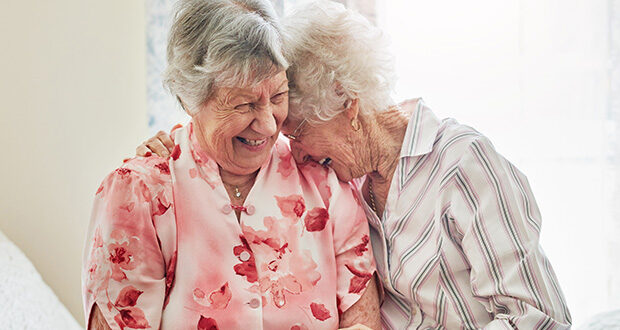Dark humour can be a guiding light for older people when navigating the complexities and trials of ageing, according to a philosophy professor.
As people age they face many challenges including loneliness, social isolation, disability, frailty, and losing friends and partners.
Macquarie University's Associate Professor in Philosophy Mark Alfano said a sense of humour could provide solace and foster resilience during times of crisis.
"Humour can conjure hope, even in the darkest of times," Professor Alfano said.
"It can counteract feelings of despair and adopt new perspectives.
"Through self-deprecating and dark humour, people can make light of their own suffering."
In his paper, Having a Sense of Humour as a Virtue, Professor Alfano delved into how dark humour could be a potent tool in the face of adversity.
Dark humour is a style of comedy that addresses topics typically regarded as taboo or considered serious or difficult to discuss.
Professor Alfano said that dark humour could improve the well-being of older people by navigating the specific challenges associated with ageing.
Some may struggle with financial difficulties, including inadequate retirement savings, rising healthcare costs, and limited employment opportunities.
A recent study revealed that nearly 60 per cent of older Australians experienced some level of financial stress amid the rising cost of living.
One in three older Australians also reported facing age-related discrimination since turning 50.
Age-related bias and discrimination are endemic problems impacting older people's access to employment opportunities, quality healthcare, and fair treatment.
Additionally, older people experience various physical health conditions, such as arthritis, heart disease, and diabetes, affecting their mobility, vitality, and overall well-being.
In 2018, almost half of older Australians had a disability, with one in five rating their disability as severe or profound.
Plus, older people face age-related cognitive changes, including memory decline and an increased risk of neurodegenerative disorders like Alzheimer's or dementia.
While these physical and cognitive shifts can impact social connectedness, losing friends and loved ones can also contribute to social isolation.
Older age often brings other emotional challenges such as grief, depression, anxiety and adapting to life transitions like retirement or changes in roles and relationships.
"In life, we are bound to face pain, suffering, and the loss of loved ones," Professor Alfano said.
"It's an inevitable part of our human experience.
"Dark humour can help us cope with these inevitabilities."
He said laughter could provide amusement that helps people find lightness amidst the challenges of suffering, vulnerability, and the transient nature of existence.
Scientific studies indicate that humour and laughter offer therapeutic advantages, such as delaying cardiovascular complications of type 2 diabetes, lower pain, and improving overall mood.
"Beyond momentary hardships, humour plays a crucial role in accepting and laughing at our imperfections," Professor Alfano said.
"It has the power to make serious matters appear less daunting."
He argued that laughter taught us about ourselves and revealed our values and perspectives.
Humans are inherently social beings who require connections and trust to thrive, he said.
A sense of humour plays a significant role in establishing trust, fostering social bonds and connecting with others who share similar values.
"Laughing together creates a sense of belonging and signifies a shared understanding," Professor Alfano said.
"Humour helps people cope with isolation and alienation, which are challenging experiences."
Professor Alfano said the recognition of humour as a vital aspect of emotional wellbeing could become increasingly important as Australia's population ages.
"It offers a ray of light and a means of navigating the complexities of ageing with grace, resilience, and a renewed sense of hope."
Do you have an idea for a story?Email [email protected]
 Aged Care Insite Australia's number one aged care news source
Aged Care Insite Australia's number one aged care news source

